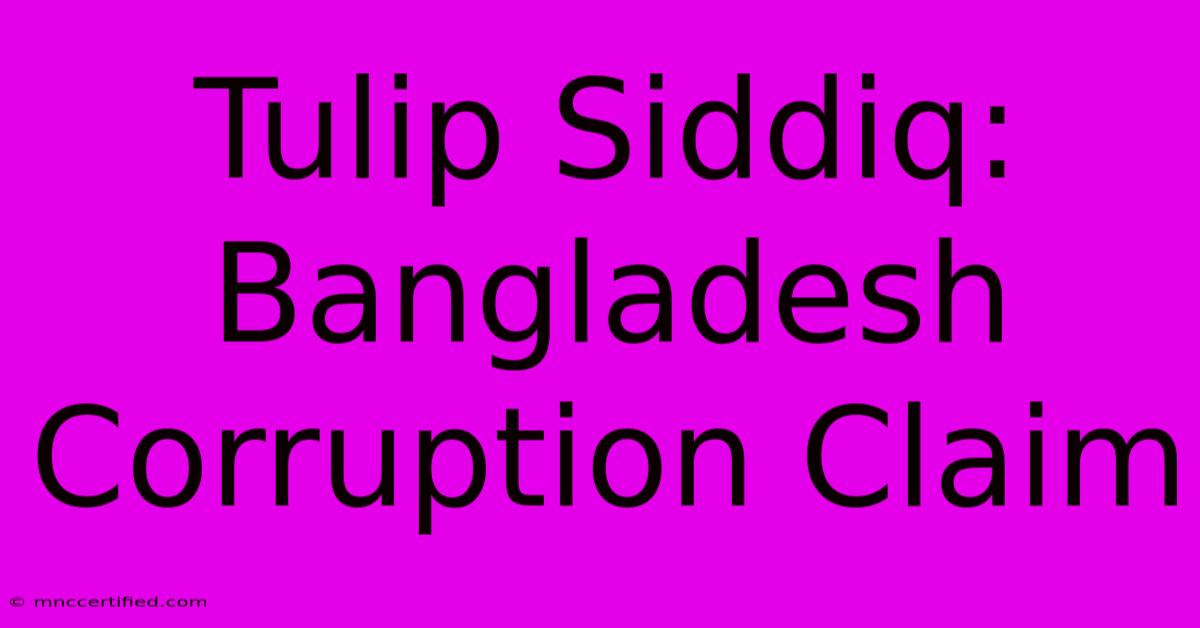Tulip Siddiq: Bangladesh Corruption Claim

Table of Contents
Tulip Siddiq: Examining the Bangladesh Corruption Claims
Tulip Siddiq, the Labour MP for Hampstead and Kilburn, has faced scrutiny regarding allegations of corruption linked to Bangladesh. Understanding the complexities of these claims requires a nuanced examination of the sources, the accusations, and the responses. This article aims to provide a comprehensive overview, allowing readers to form their own informed opinions.
The Allegations: What's Being Claimed?
The allegations against Tulip Siddiq primarily center around her family's business dealings in Bangladesh and potential conflicts of interest. While specific details vary depending on the source, common threads include accusations of:
- Improper business practices: Some reports allege that Siddiq's family's business activities in Bangladesh have not adhered to ethical standards or local regulations. These accusations often lack specific verifiable evidence, making independent verification difficult.
- Influence peddling: There are suggestions that Siddiq's political position has been leveraged to benefit her family's business interests in Bangladesh. These claims often rely on circumstantial evidence and require rigorous investigation.
- Lack of transparency: Critics point to a perceived lack of transparency surrounding Siddiq's financial affairs and her family's business dealings in Bangladesh. This lack of transparency fuels speculation and makes it harder to definitively assess the claims.
It's crucial to highlight that these are allegations, not proven facts. The burden of proof lies on those making the accusations to provide credible and verifiable evidence.
Analyzing the Sources: Where are these Claims Originating?
The sources of these allegations are diverse, ranging from:
- Opposition political parties: Political opponents in both the UK and Bangladesh may use such claims for strategic advantage. It's important to consider the potential bias inherent in such sources.
- Media outlets: Different media outlets have reported on these allegations with varying degrees of detail and impartiality. Critically evaluating the journalistic standards and potential biases of the reporting source is essential.
- Anonymous sources: Some allegations rely on anonymous sources, which inherently limits verifiability and raises concerns about credibility. Information based on anonymous sources should be treated with caution.
- Social Media: Social media platforms often amplify such accusations, sometimes without proper fact-checking or context. Therefore, information from social media requires careful scrutiny.
Tulip Siddiq's Response: What has she said?
Tulip Siddiq has consistently denied any wrongdoing and has called for thorough investigations into the allegations. The specifics of her responses and the evidence she has presented (if any) should be carefully considered when evaluating the claims.
The Importance of Due Process and Fair Reporting
It is vital to remember that accusations of corruption are serious matters with potentially significant consequences. Due process must be followed, and all individuals are entitled to a fair hearing and the presumption of innocence until proven guilty. Responsible journalism demands rigorous investigation and verification before publishing allegations.
Conclusion: The Need for Transparency and Accountability
The allegations surrounding Tulip Siddiq and her family's business dealings in Bangladesh highlight the importance of transparency and accountability in public life. While the accusations require careful scrutiny and verification, the lack of transparency surrounding certain aspects fuels speculation. A thorough and impartial investigation, if warranted, is crucial to establish the truth and maintain public trust. Readers should actively seek information from multiple reliable sources, critically evaluate the evidence presented, and avoid making conclusions based solely on unsubstantiated claims. The ongoing discussion surrounding these allegations underscores the need for continuous vigilance in ensuring ethical conduct within politics and business.

Thank you for visiting our website wich cover about Tulip Siddiq: Bangladesh Corruption Claim. We hope the information provided has been useful to you. Feel free to contact us if you have any questions or need further assistance. See you next time and dont miss to bookmark.
Featured Posts
-
Astros Top Target Veto Impact
Dec 20, 2024
-
Willis Removed Appeals Court Ruling
Dec 20, 2024
-
Fox News Anchor Cavuto Bids Farewell
Dec 20, 2024
-
A Welcome Return Supermans Back
Dec 20, 2024
-
Thursday Night Football Broncos Chargers Odds
Dec 20, 2024